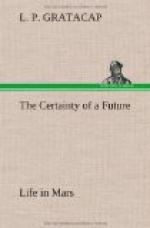Astronomy had a great charm for my mother. Her enthusiasm was soon communicated to my father who found his wealth was a requisite in establishing the observatory he had erected at Irvington and in its equipment. Telescopes are expensive playthings.
The Lick Observatory was begun in 1880 and my father through correspondence with the directors of the University of California had learned many of the details pertaining to this great project. Influenced by the splendid prospects of this undertaking my father determined if possible to surpass it. He wrote to Fiel of Paris and expected to be able to secure an objective of 4 feet diameter, exceeding that of the Lick Observatory by one foot, a hopeless and as it proved an utterly abortive design. He spent an entire year in New York after leaving Irvington examining the various possible locations for his new observatory. The requisites were nearness to the equator, an equable climate, elevation and a clear atmosphere. During this year my father heard that Prof. Hertz of Berlin had generated waves of magnetism and that it was hoped that these might ultimately prove efficacious as a means of direct communication between distant points without the introduction of wire conductors.
This thought of communicating with distant points without fixed conductors greatly impressed my father and led him along a line of speculation upon which finally rested my own success in securing the messages detailed in this book from the planet Mars.
I recall that one evening in the winter of 1881 while he was yet engaged in making preparations for his departure from the United States to New Zealand, which he finally chose for the erection of his laboratories, and especially his observatory, I heard him read with the greatest satisfaction of the attempt made in the siege of Paris to bring the besieged French into telegraphic communication with the Provinces by means of the River Seine.
It was proposed to send powerful currents into the River Seine from batteries near the German lines and to receive in Paris upon delicate galvanometers, such an amount of their current as had not leaked away in the earth. Profs. Desains, Jamin, and Berthelot were interested in these experiments, although the suggestion had been made by M. Bourbouze, and after some interruptions when the attempt was to be carried out, the armistice of Jan. 14, 1871, brought their preparations to a close.
How often my father spoke of these attempts, and half smilingly on one occasion as we watched the starry skies “thick inlaid with patterns of bright gold” said to me: “It seems to me within the reach of possibility to attain some sort of connection with these shining hosts. If we must assume that the disturbances on the Sun’s surface effect magnetic storms on ours, it is quite evident that a fluid of translatory power or consistency exists between the earth and the sun, then also between all the planetary inhabitants of space, and I cannot




